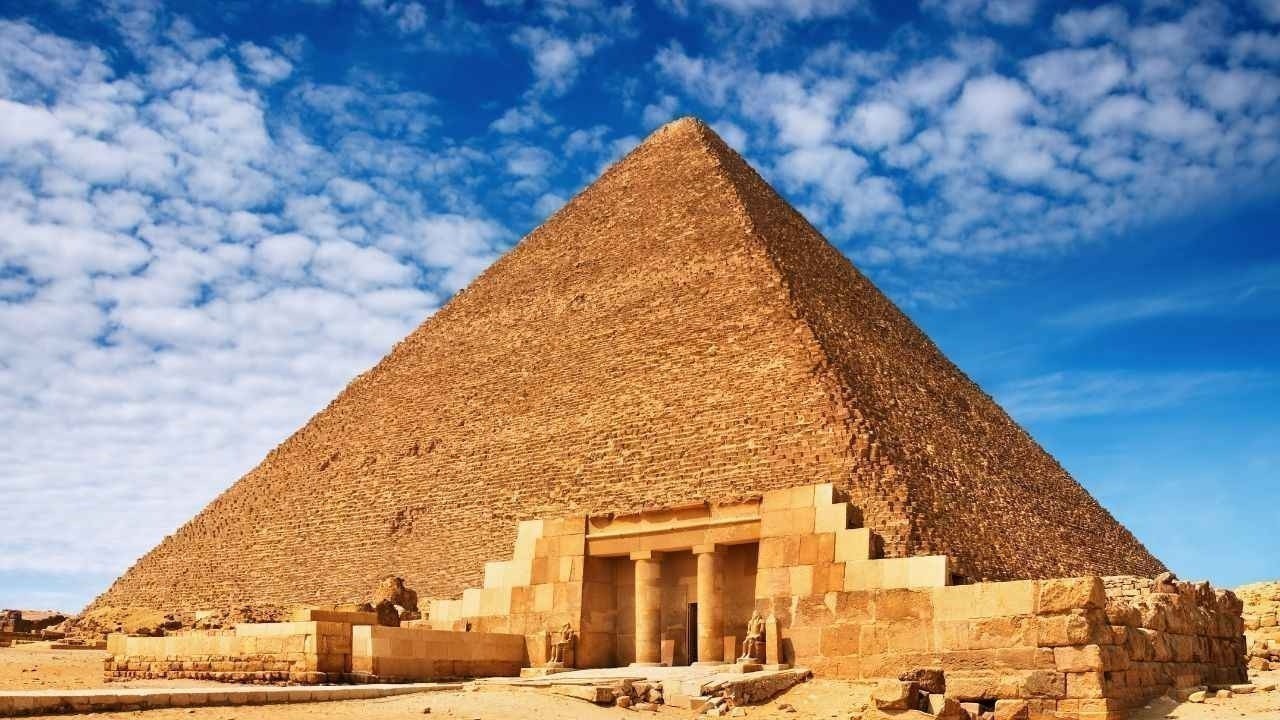
Post by : Samir Safi
For thousands of years, the pyramids have stood as silent guardians of history — massive monuments that continue to fascinate, mystify, and inspire awe. Rising from the deserts of Egypt and beyond, these ancient structures are more than just stone tombs; they represent the peak of early human ingenuity, engineering brilliance, and spiritual ambition.
But what are the secrets of the pyramids? How did civilizations with no modern machinery create such perfectly aligned, massive monuments that have withstood millennia? Let’s explore how ancient engineers, architects, and workers achieved the impossible and built the timeless wonders that continue to amaze us today.
The pyramids are more than architectural achievements — they are symbols of eternity. The most famous of them all, the Great Pyramid of Giza, is the only surviving wonder of the ancient world. Built around 2560 BCE for Pharaoh Khufu, this enormous structure originally stood over 146 meters tall and was constructed using approximately 2.3 million limestone blocks, each weighing several tons.
What makes the Great Pyramid so astonishing is not just its size but its precision. The base is almost perfectly square, and its sides are aligned with the cardinal points of the compass. Even with today’s advanced tools, replicating such accuracy would be a monumental challenge.
This blend of mystery, scale, and perfection explains why the secrets of the pyramids continue to captivate historians, archaeologists, and engineers alike.
For centuries, scholars have debated the question: “How were the pyramids built?”
Without cranes, steel tools, or engines, ancient Egyptians relied on ingenuity, teamwork, and sophisticated planning.
Contrary to popular belief, the pyramids were not built by slaves but by organized teams of skilled workers. Archaeological discoveries show that tens of thousands of Egyptians participated in the construction — from engineers and stonemasons to carpenters and laborers. They lived in nearby workers’ villages, were well-fed, and took pride in their work. Building a pyramid was considered an honor, a service to the gods and the pharaoh.
Most of the limestone used for pyramid construction came from nearby quarries, while granite blocks — used for the inner chambers — were transported from Aswan, hundreds of kilometers away. Workers likely moved these stones using wooden sledges across paths lubricated with water or mud to reduce friction. This clever technique allowed them to slide blocks weighing several tons with surprising efficiency.
The most widely accepted explanation for how massive stones were lifted involves ramps.
Straight ramps may have been built in front of the pyramid, extending upward as the structure grew taller.
Spiral ramps could have wrapped around the pyramid’s sides, allowing stones to be moved gradually upward.
Some researchers suggest internal ramps, hidden within the pyramid’s core, which would explain how precise alignments were achieved with minimal external scaffolding.
While no single theory can fully explain every detail, the ramp hypothesis remains the most logical and supported by archaeological evidence.
The ancient Egyptians were masters of mathematics and astronomy, and the pyramids reflect this knowledge.
The Great Pyramid’s alignment to true north is incredibly precise — off by less than a fraction of a degree. Scholars believe the builders used the stars, particularly those in the constellation Orion, as reference points.
The pyramid’s proportions also reveal mathematical sophistication. The ratio of its height to its perimeter mirrors the relationship between the radius and circumference of a circle, closely approximating π (pi). Such accuracy suggests that the Egyptians combined geometry, observation, and spiritual symbolism in their designs, turning their monuments into cosmic representations of order and harmony.
The engineering of the pyramids continues to baffle modern scientists. Every block was cut, shaped, transported, and placed with extraordinary precision. The joints between stones fit so closely that not even a sheet of paper can fit between them.
Ancient engineers used simple yet effective tools like copper chisels, dolerite pounding stones, wooden rollers, and levers. But the real secret was in their organization and planning. The Egyptians designed ramps, marked stone layers with red ochre, and worked in teams assigned to specific tasks.
The result? A construction process that combined human muscle, mathematics, and meticulous planning — a true testament to ancient engineering genius.
Although Egypt’s pyramids are the most famous, they’re not the only ones in the world. Other ancient civilizations built pyramid-like structures for very different purposes.
Mesoamerican pyramids, such as those at Chichen Itza and Teotihuacan in Mexico, were primarily temples dedicated to gods rather than tombs. They featured staircases and flat tops for rituals and sacrifices.
In Sudan, the Kingdom of Kush built over 200 smaller, steep-sided pyramids as royal tombs.
Mesopotamian ziggurats, predecessors to pyramids, were layered temples representing a connection between heaven and earth.
These examples show that the pyramid shape — stable, symbolic, and monumental — emerged independently across cultures as a universal symbol of power, divinity, and endurance.
Even today, new technologies are revealing more about the secrets of the pyramids. Using tools like ground-penetrating radar, 3D scans, and cosmic-ray imaging, scientists have discovered hidden chambers and tunnels within the Great Pyramid that may hold undiscovered artifacts or engineering insights.
Despite these breakthroughs, much remains unknown. How did workers lift the heaviest blocks weighing over 70 tons? Why were the internal passages designed with such specific angles and alignments? And what symbolic meanings might still be hidden in the pyramid’s geometry?
The more we uncover, the more the pyramids seem to guard their secrets — a silent reminder that some mysteries endure by design.
The story of the pyramids is not just about architecture or engineering — it’s about human ambition. These ancient wonders show that thousands of years ago, people could unite under a shared vision and accomplish something that still defies imagination today.
The pyramids of Egypt remain timeless not because they are old, but because they embody the eternal desire to reach for the heavens — to leave behind something that transcends time, culture, and mortality.
The real secret of the pyramids lies in this truth: they were built not only from stone but from faith, intelligence, and an unyielding belief in human potential.

Israel Receives More Hostage Remains from Hamas Amid Fragile Gaza Ceasefire
Hamas hands over remains of nine hostages to Israel as part of a fragile Gaza ceasefire, with tensio

Indian Retail REITs Market Set to Reach ₹80,000 Crore by 2030: ANAROCK
India’s retail REITs market to grow into a ₹60,000–₹80,000 crore segment by 2030, driven by Grade A

India’s Industrial and Logistics Real Estate Sector Grows 28% in 2025
India’s industrial and logistics real estate leasing surges 28% YoY in 2025, led by 3PL, e-commerce,

India’s Office Market 2025: Demand Outpaces Supply for Sixth Straight Quarter
India’s office leasing rises 31% YoY as demand outpaces supply for the sixth straight quarter; Benga

Sobha’s Profit Doubles in Q2 2025 Amid Surge in Premium Housing Demand
Sobha’s Q2 profit more than doubles to ₹725 crore as India’s premium housing demand and record pre-s

Dubai Property Rally Nears Pre-2008 Record Highs
Dubai’s real estate market is surging again — prices up ~75% since 2021, rally closing in on pre-200

Dubai Land Department Showcases 19 Years of Digital Transformation at GITEX Global 2025
DLD marks 19 years of digital transformation at GITEX 2025, unveiling AI, blockchain, and PropTech s

7 Best International Destinations for Vegetarian Travellers Delicious & Travel Friendly
Discover 7 top international destinations for vegetarian travellers with delicious meals vibrant cul

Morning Habits of Highly Successful People Start Your Day the Smart Way
Discover the powerful morning habits of highly successful people and learn how starting your day rig

Beyond the Gym Dubai’s Outdoor Fitness Revolution on Beaches & Skylines
Explore Dubai’s outdoor fitness revolution on beaches and skylines blending health community and sce

AI in Dubai’s Luxury Salons Personalized Skincare Meets Technology
Discover how Dubai’s luxury salons use AI to create personalized skincare routines blending technolo

The $1 Million Secret Dubai’s Luxury Longevity Clinics and Personalized Wellness Revolution
Explore Dubai’s $1M longevity clinics offering luxury high tech treatments and personalized wellness

Pankaj Dheer The Timeless Villain Who Shaped Indian Television
Discover Pankaj Dheer’s legendary journey from iconic villain to timeless TV star inspiring generati

Best Whole Grains for Weight Loss Healthy Nutritious & Easy to Include
Discover the best whole grains for weight loss boost metabolism stay full longer and enjoy healthy n

Top 4 Protein Packed Nuts and How to Include Them Daily
Discover the top 4 protein rich nuts and simple ways to include them in your daily diet for better h